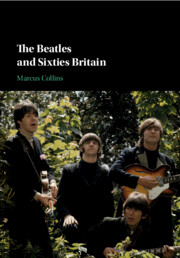Book contents
- The Beatles and Sixties Britain
- The Beatles and Sixties Britain
- Copyright page
- Contents
- Figures
- Tables
- Preface: Imagining the Beatles
- Introduction
- 1 The Other Sixties: An Anti-Permissive Permissive Society?
- 2 Society, 1963–1965: The Beatles and Modernity
- 3 Society, 1966–1970: The Beatles Go Too Far
- 4 Culture: The Beatles as Artists
- 5 Politics: The Beatles, Parliament and Revolution
- Conclusion
- Notes
- Bibliography
- Index
1 - The Other Sixties: An Anti-Permissive Permissive Society?
Published online by Cambridge University Press: 11 March 2020
- The Beatles and Sixties Britain
- The Beatles and Sixties Britain
- Copyright page
- Contents
- Figures
- Tables
- Preface: Imagining the Beatles
- Introduction
- 1 The Other Sixties: An Anti-Permissive Permissive Society?
- 2 Society, 1963–1965: The Beatles and Modernity
- 3 Society, 1966–1970: The Beatles Go Too Far
- 4 Culture: The Beatles as Artists
- 5 Politics: The Beatles, Parliament and Revolution
- Conclusion
- Notes
- Bibliography
- Index
Summary
This chapter uses contemporary opinion polls to provide the necessary context in which to understand contemporary attitudes towards the Beatles. The polls under analysis encompass permissiveness in its broadest sense. They include polls about women, ethnic minorities and the young as well as those concerning abortion, the age of majority, birth control, censorship, capital punishment, corporal punishment, divorce, drugs, gambling, homosexuality, illegitimacy, prostitution, religion and suicide. The chapter introduces the concept of an ‘anti-permissive permissive society’ to account for the ambivalence of public attitudes displayed in polling data. Most people perceived a permissive society as coming into being from the 1960s onwards, but they disapproved of most of its manifestations and legislative reforms. The chapter then drills down into the raw data of opinion polls to compare attitudes towards different issues across demographic groups. The variations seen across age, gender, class, religion, region, nation, education and marital status reveal a complexity not captured in standard models of sixties Britain and provide clarity regarding which elements of British society were more permissive than others. Although the Beatles, like the typical permissive respondent, were young and male, they were in most other respects singularly unrepresentative representatives of sixties Britain.
Keywords
- Type
- Chapter
- Information
- The Beatles and Sixties Britain , pp. 23 - 47Publisher: Cambridge University PressPrint publication year: 2020



